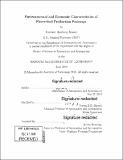Environmental and economic characteristics of electrofuel production pathways
Author(s)
Isaacs, Stewart Anthony.
Download1292944576-MIT.pdf (4.703Mb)
Other Contributors
Massachusetts Institute of Technology. Department of Aeronautics and Astronautics.
Advisor
Steven R.H. Barrett.
Terms of use
Metadata
Show full item recordAbstract
Electrofuels are liquid fuels derived from CO₂ and electricity, which have the potential to store intermittent renewable power and reduce transportation's climate impact. In this work, I assess the economic and environmental characteristics of four technology pathways for electrofuel production, using the methods of life cycle analysis and techno- economic assessment. In addition, the analysis includes a number of scenarios in which the technologies are powered directly from dedicated renewable electricity generation. The results indicate that the hybrid power- and biomass-to-liquids (PBtL) pathway may represent a promising option for electrofuel production in terms of lifecycle emissions reductions and minimum selling price. I further characterize the PBtL pathway by combining spatially-resolved data on biomass cultivation, electricity generation, and cost-optimized solar-hydrogen production in the United States (US). I find that the resulting fuel would have a minimum selling price between $2.10 and $3.81 per liter and lifecycle emissions of 15-27 [subscript g]CO₂[subscript e]/MJ depending on the production location.
Description
Thesis: S.M., Massachusetts Institute of Technology, Department of Aeronautics and Astronautics, February, 2019 Cataloged from the official PDF of thesis. Includes bibliographical references (pages 63-66).
Date issued
2019Department
Massachusetts Institute of Technology. Department of Aeronautics and AstronauticsPublisher
Massachusetts Institute of Technology
Keywords
Aeronautics and Astronautics.